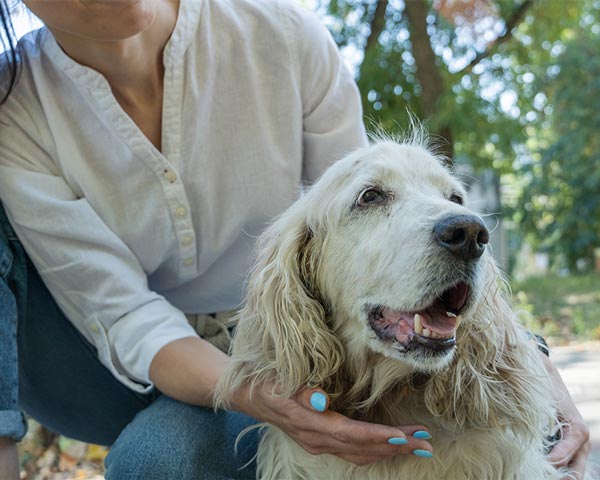Everything You Need to Know About Adopting Senior Dogs


Americans adopt 1.6 million dogs from shelters every year, that’s about half of the annual shelter intake, meaning senior dogs are ignored because they aren’t seen as suitable adoption candidates. There’s a stigma attached to adopting senior dogs. But it’s not founded in reality. Older dogs can be more loving, better trained, and a closer fit for you and your family.
Are you interested in adopting a new furry companion? You should consider an older dog before heading to the shelter. Here’s why and how to adopt a senior dog.
Adopting Senior Dogs
The pet adoption process starts at either a shelter or a rescue. Nowadays, many of these organizations manage websites that provide pictures of their current pets.
Shelters and rescues perform the same service, but they sport some fundamental differences. Local governments often fund shelters, though some are owned by private groups. In general, it’s both cheaper and faster to adopt a senior dog, or any animal, from a shelter.
In contrast, rescues are often volunteer groups that run off donations. Rather than owning in-site kennels, the organization relies on a network of volunteers to house and care for the animals. Although rescues are more expensive, they tend to be more knowledgeable about their individual pets.
Start your search online by looking at pets from shelters and rescues in your area. You could also choose to visit a shelter on a whim, without any prior information.
If you go through a shelter, you’ll visit the physical location and spend some time with the dog yourself. You’ll need to either call or email a rescue. Although they don’t have a physical location, rescues run adoption events or can set up a home visit for you to meet the senior dog.
If it’s a good fit, you’ll fill out some paperwork and pay an adoption fee. In return, the shelter or rescue will give you vaccination paperwork and let you take your new family member home.

What to Expect After Adopting Senior Dogs
Like younger dogs, the older ones still need time to adjust to new living conditions. Your quiet home is a big change compared to the din and clamor of the shelter.
It is not unusual for your senior dog to seem reclusive and exhausted for the first few days. This may be the first time they’ve been able to sleep well in a relaxed environment. They may be too uncomfortable to eat, drink, or even move.
Find a comfortable, confined space for your senior dog, such as a walk-in closet. It’s here you can provide a modern dog bed, food and water, and a place to feel secure as they gather the confidence to explore their new surroundings.
Of course, some pets, especially those from rescues, may adjust much more quickly. Give your older dog the personal time he or she needs.

Reasons to Adopt a Senior Dog
Puppies get all the love. But the reality is senior dogs are just as deserving, if not more, than their younger selves. Some families may even be surprised to discover that older dogs can be a better fit.
Here are a few reasons to adopt a senior dog over a puppy.
1. Senior Dogs Are Already Trained
It’s easy to forget that even well-behaved puppies can be a handful. Between tearing up furniture and making messes in the house, young dogs require heavy behavioral training.
But senior dogs are already great pets. They know to do their business outside and are familiar with household living. Any senior dog will seamlessly integrate itself into your family without correctional help.
2. They Make the Best Nap Companions
Adult dogs are more mellow and have less energy. If you want a lap dog, look no further than an older canine companion. They’ll be perfectly content to sleep through many hours of the day and may only need the occasional walk.
However, senior dogs can still enjoy an active lifestyle. Just take care not to overwork your new best friend.
3. “Senior” Doesn’t Mean Anything
When people think about senior dogs, they imagine geriatrics on shaking legs. But that’s just not true.
On average, a “senior” dog is seven years old. Yet the classification varies depending on species. A large dog could be considered a senior at only four or five years old with plenty of years to spare.
In short, senior dogs are still filled with many years of life and love.
4. Behavioral Issues Are Overstated
Shelters dogs aren’t bad dogs; they’re good dogs in bad situations. People lose or give up their pets for a variety of reasons, and sometimes that leads to great housepets spending time at a shelter.
It’s true that a select few pets may have behavioral issues. However, rescues and shelters offer training services to make them viable adoption candidates.
5. Older Pets Are at Risk of Euthanasia
When you adopt an older dog, you save a life. There’s limited space in shelters, which means sometimes they have no choice but to euthanize some of their pets. Older dogs are at the highest risk of euthanasia due to the potential cost of their health conditions.
And not only are you saving a life, but you’re ensuring they live out their golden years with the comfort and affection they deserve.

Adopt Your New Best Friend
Say goodbye to puppy power and hello to senior strength! Adopting senior dogs is a fulfilling and worthwhile decision for any family. Once you find yours, you’ll start to wonder why people even prefer younger dogs in the first place.


